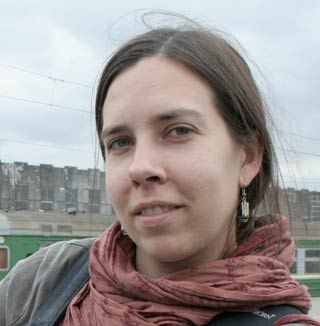Allison Duwe: Activist, Marching Band Member
Get to know a Buffalonian
Allison Duwe is executive director of the Colaition for Economic Justice, which advocates for sustainable communities through decent jobs. CEJ pushed living wage legislation through Buffalo’s City Hall, and is now lobbying for reform of the state’s economic development programs. (To mark the one-year anniversary of the federal bank bailouts, CEJ will hold a protest in front of the state-subsidized Waterfront Place condominiums today, October 1, at 4pm.) Duwe is also a member of the Springville All Stars Marching Band.

You’re not just a campaigner for social and economic justice. You’re also in a marching band.
Wow, Buffalo really is a small town. It’s hard to get away with having a hobby while attempting to be taken seriously as a professional. I thought I could hide behind the uniform, but I guess not. More seriously—I am lucky enough to have a job that lines up with my personal values and allows me to do something meaningful every day. Being in a band is an opportunity to have a life outside of work and spend more time with my family (my one-and-a-half-year old is the official band manager and my husband wields a pretty mean marching tuba.)
Are there similarities between marching in the band and, say, organizing a demonstration in front of City Hall?
Both are performative but other than that I don’t see all that much overlap. CEJ doesn’t organize activities in front of legislative buildings or corporate headquarters just to have fun.
What are CEJ’s current campaigns?
The Coalition for Economic Justice is primarily focused on the creation of quality jobs for people in our communities. Specifically this has led us focus on improving wage standards and working conditions for low-wage workers in a number of industries—by supporting unionization and organizing efforts, by advancing living wage policies at the local level, and by advancing policy at the state level through coordinated campaigns to change how we do economic development in New York State.
How many people in Buffalo live in poverty? How many have jobs that pay less than a living wage?
Nearly 30 percent of people in Buffalo are living in poverty. What surprises people is that a lot of the folks that make up this statistic are working, many full-time and many at more than one job. The problem is simple. These jobs don’t pay enough. Over 34 percent of workers in our greater region are earning less than $26,000/year. These workers might not be living in poverty according to our terribly outdated federal poverty guidelines but they are definitely struggling to some degree.
How’d you come to this sort of work? Was there ever a cusp, a turn in life that might have led you to become, say, a banker?
Not likely. Perhaps a lawyer, but not a banker. I spent several years working as a union organizer after college. I primarily organized low-wage workers that worked in direct care facilities with the developmentally disabled, in industrial laundry facilities, or doing janitorial and service work in airports. The work was great but I got tired of traveling and not being able to invest in one place.
blog comments powered by Disqus|
Issue Navigation> Issue Index > v8n40 (week of Thursday, October 1, 2009) > Allison Duwe: Activist, Marching Band Member This Week's Issue • Artvoice Daily • Artvoice TV • Events Calendar • Classifieds |









 Current Issue
Current Issue